CONTROVERSY ON THE " GREATEST HAPPINESS KINCIPLE."
The Edinburgh Review just published contains another .article on the " greatest happiness principle" of Mr. BENTHAM, in reply to the last exposition of it in the Westminster. We believe that the public must be pretty well tired of a controversy in which no advance ismade ; and the wranglers who conduct it ought to be by this time sickaied of their own egotism. In their hands it has proved a most barren discussion —and for this simple reason, that neither of them understands what I he is writing about. As for the Westminster Reviewer, he stands self-convicted of ignorance—he has changed his positions, and given up each in succession ; and the writer in the Edinburgh, though he has evinced a greater degree of cleverness than his antagonist, knows , quite as little of the principles or spirit of BENTHAM'S philosophy. The "greatest happiness principle," he reiterates in the present num- ber, is either a truism, or a contradiction in terms ; for if the happiness . of every individual coincides with that of the greater number, it is need- ; less to tell any man to pursue it does not coincide with the happi- ness of the greater number, it is in vain to tell him to sacrifice his t own happiness to that of the majority.
Now this chances to be gross, unalloyed nonsense. It has as little connexion with BENrussm's system as it has with -the system of ; COPERNICUS. Mr. BENrsram does not preach to individuals on their duties to the community, nor does he attempt to limit or define the sources and means of individual happiness. He merely states what ought to be the ruling principle of governments. He argues that these institutions should minister to the happiness of the many, not of the few, and that indivithals should be left free to choose their • own modes of enjoyment. This is the "greatest happiness principle" of Mr. BENTHAM—it professes to be an exposition not of the duties that individuals owe to each other, but of the duties that governments owe to the governed. It does not specify the sacrifices that individuals ought to make for the community, nor hold that the good of the community ought to be the first consideration of individuals : on the contrary, it teaches that every individual is entitled, in the first instance, to pro- secute his own happiness as far and in as many ways as he pleases,— providing, in the second, his doing so does not interfere with the equally ' strong right of his neighbours to follow the same course : it teaches ' that the only use of governments is to prevent the members of the community as far as possible from injuring each other; and that the community have an inalienable right to insist that governments shall provide for or at least not interfere with the happiness of the greatest number.
The Edinburgh Review reiterates, too, on the present occasion, the assertion that the "greatest happiness principle" is involved in the Christian dispensation, and that Mr. BENTHAM has not improved upon the maxim "Love thy neighbour as thyself." What connexion, what point of comparison is there, in the name of common sense, behveen BENTHA1SI'S theory of government and CHRIST'S system of morals— between Utilitarian legislation and the sermon on the mount? If the , reviewer understood the principle which he has been cavilling at for twelve months past, he could never have been guilty of the absurdity of attempting to prove the want of parallelism between the objects which he has classed together ; he would perceive that he has to deal , with BENTHAM not as a moralist, but as a legislator—net as an ex- pounder of the duties of individuals, but as a teacher of the uses of government,


















 Previous page
Previous page